It’s finally here!
Our summer reading list arrives just a wee bit later than the solstice — but that’s in keeping with summer temps themselves this year.
But you know, we’ll take June sweater weather over a heat dome any day. And it’s heartening to see a much more relaxed beginning to wildfire season.
Hopefully we’ve caught you just as you’re unfurling your hammock and settling into beach season, because we’ve got some great books to recommend.
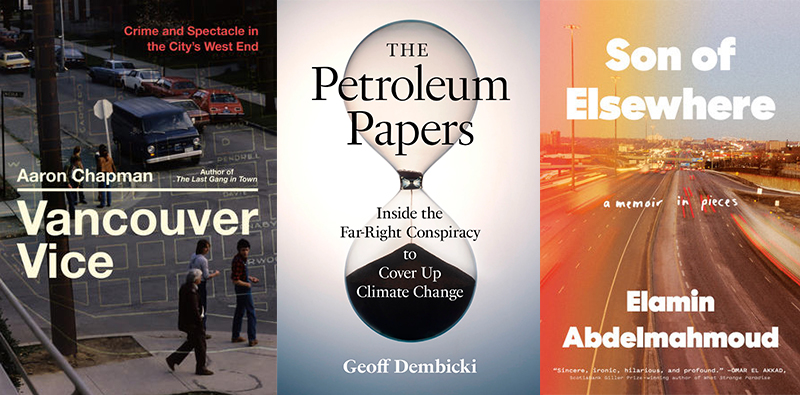
While you’re waiting for the fireworks to start at English Bay:
Aaron Chapman, Vancouver Vice: Crime and Spectacle in the City’s West End (Arsenal Pulp Press)
Where does sex work belong in a city? In the 1970s and ’80s, that question rocked Vancouver’s West End, where a busy sex trade operated openly along Davie Street. Aaron Chapman, a journalist and urban historian, explores this raucous period in the city’s history, starting and ending his narrative with the discovery of a body in a car in Stanley Park in 1984. That journey leads deep inside a story of exploitation, liberation and civic unrest in this deceptively picturesque urban neighbourhood.
For readers fighting climate change denialism:
Geoff Dembicki, The Petroleum Papers (Greystone)
“There [is] nothing inevitable about the chaotic future we face, with all of the natural systems that support us collapsing,” writes Tyee contributor Geoff Dembicki in the introduction to his book The Petroleum Papers. “We are here because at each critical juncture, fossil fuel companies, dependent on a particularly dirty form of oil, worked in concert with political allies in the U.S. and Canada to build an edifice of lies that has prevented our self-rescue.” It’s an incendiary claim — and one Dembicki painstakingly supports with deep research, winding the stories of oil execs together with the lawyers and activists fighting back against a massive climate-destroying behemoth.
If you’re down and you need a friend:
Elamin Abdelmahmoud, Son of Elsewhere: A Memoir in Pieces (McClelland & Stewart)
There’s a musicality in Elamin Abdelmahmoud’s big-hearted prose that easily conjures the author’s speaking voice and what it must be like to walk through the world with him, laughing as much as you’re talking. The Toronto writer and podcast host is beloved by his readers and listeners for a reason: his work is as funny and relatable as it is vital and challenging, inviting audiences to learn with him as he strives to find his way in the world and do right by the people around him. Abdelmahmoud’s first book is an essay collection that considers how he came to be who he is, inviting readers to turn the mirror on themselves. He offers an incisive look at how Blackness is both construct and experience, how colonialism shapes how we perceive ourselves, and what it means to live with a foot in many worlds, pro wrestling and The O.C. and Islam and all. The result is a tremendous, hopeful collection that reminds us of the joy in learning what it means to be alive.
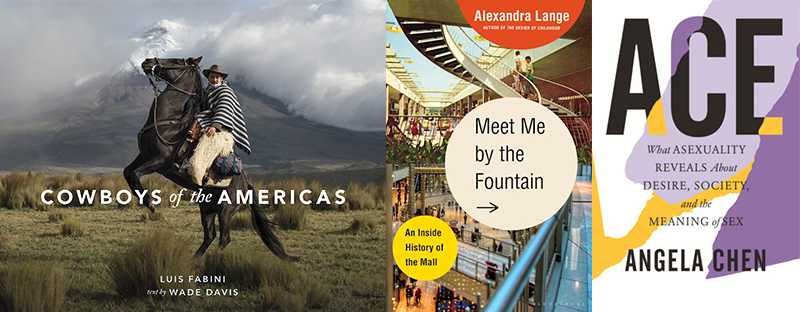
To read after binge-watching 'Yellowstone':
Luis Fabini, Cowboys of the Americas (Greystone)
A stunning photography collection capturing gritty, lonely, romantic individuals who appear like memories on the page, transporting us into a world thought lost. The cowboys range from the breast-plated, sun-leathered Vaqueiros of Brazil to the ranchers of Alberta’s wide grasslands and, when combined with Davis’s essay on the history — or mythology — of the cowboy and their horse, the book becomes a contemplation on the connection between humankind and the land under our hooves.
For a new perspective on the much-maligned capitalist behemoth you may find yourself in this summer:
Alexandra Lange, Meet Me by the Fountain: An Inside History of the Mall (Bloomsbury)
Yes, summer is all about the great outdoors, but let’s not forget about the time spent in the great air-conditioned indoors as well. For all the bad rap that malls get for being monotonous spaces of consumption, that’s not how they started out. We are introduced to Austrian architect Victor Gruen, who dreamed up America’s first shopping malls as a social solution for suburban ennui, based off the charm of public life in Vienna with people gathering on streets around fountains. The book takes us to the present day, with the role of malls in protests and in battle with online shopping, and asks whether malls are dead — with increasing closures and their growing role in apocalyptic fictions.
If you’ve ever wondered what the 'A' in 2SLGBTQIA+ means:
Angela Chen, Ace: What Asexuality Reveals About Desire, Society and the Meaning of Sex (Beacon Press)
How do you deal with a world that seems obsessed with sex — especially if you’re just not that into it? This is a question that asexual people, or “aces,” deal with every day, and the same one Angela Chen investigates in Ace. Drawing upon her own experience as an ace and a journalist, Chen invites everyone — not just asexual people — to rethink how our assumptions about sex, romance and intimacy affect all of our relationships.
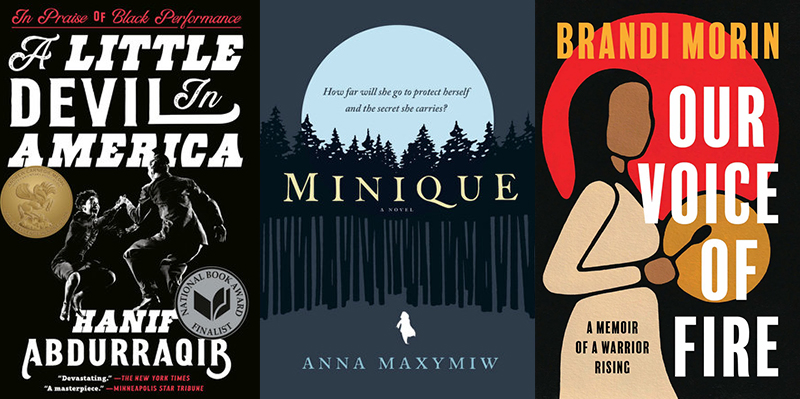
For those looking forward to in-person concerts and plays:
Hanif Abdurraqib, A Little Devil in America: In Praise of Black Performance (Penguin Random House)
If you just spent a second rainy COVID winter without much theatricality in your life, this collection of essays will be a salve. Part poetry, part memoir and part cultural criticism, Abdurraqib's A Little Devil in America takes us through how Black performances big and small celebrate joy, resist injustice and inextricably shape American culture. Each essay — whether it's on Whitney Houston, Merry Clayton or dance-a-thons — is a meditation on the vulnerable power of performance and the importance of its witnesses. Your newfound appreciation for your own role as an audience member will certainly return to concert halls and dive bars whenever you do.
If you’re looking to time-travel this summer:
Anna Maxymiw, Minique (McClelland & Stewart)
Based in 17th century Montreal, Minique is the story of a young settler woman who lost her mother, a fille du roi, early, and who barely sees her coureur du bois father. It is a story of colonialism and religious repression and proto-feminism and difficult familial and romantic relationships; it is also a rollicking, tension-filled novel full of complexity and vivid detail. The power of fiction is that it can simultaneously offer an escape from our present reality and hold a mirror up to it. Maxymiw’s Minique does both deftly and successfully.
To broaden your understanding of Indigenous experiences in Canada:
Brandi Morin, Our Voice of Fire: A Memoir of a Warrior Rising (House of Anansi)
Brandi Morin is a survivor. She lived a difficult childhood and narrowly escaped becoming one of thousands of missing or murdered Indigenous women in Canada to become a leading voice in Canadian journalism, lifting the voices of Indigenous people and their stories. The French, Cree and Iroquois journalist from Treaty 6 territory in Alberta has now written her first memoir, due in early August, one full of heart and empathetic insights. One suspects it won’t be her last.
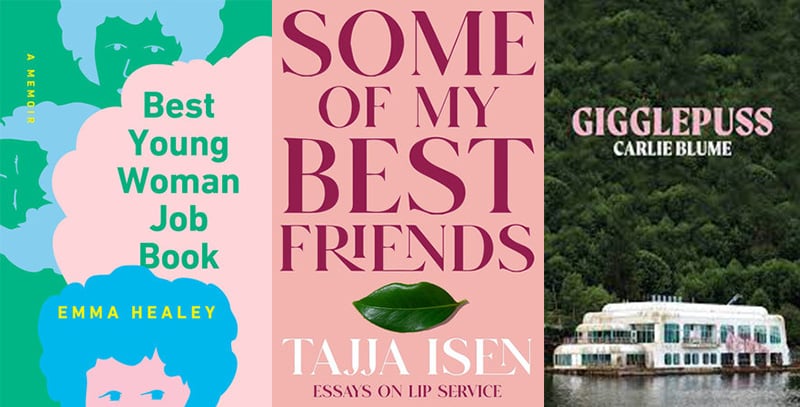
For a deeper dive into what millennials mean when they talk about making a living in writing:
Emma Healey, Best Young Woman Job Book (Random House Canada)
A poetically structured memoir (and we mean that in the best way), Best Young Woman Job Book explores how to make rent when what one wants to make is a creative life. It’s about how to make space for art — but it’s also about how to make space in art, in a culture where MFA instructors seem to use their classrooms as dating pools, and the jobs one finds on Craigslist lead to a desk setup in the corner of your new boss’s bedroom. In some ways, it’s a highly millennial book — jobs in Montreal’s booming porn sector and SEO, a surreal trip or two to Banff — and in other ways, it’s just a clear window into what work is like now. Perhaps most importantly, it’s also honest and funny.
For when ‘woke’ corporate overlords got ya down:
Tajja Isen, Some of My Best Friends: Essays on Lip Service (Doubleday Canada)
Some of My Best Friends: Essays on Lip Service is a collection of nine essays in which Catapult magazine editor-in-chief Tajja Isen zeroes in on the lip service paid to messages of diversity in many industries — even as on-the-ground inequality stubbornly persists in the workplace and public. Using firsthand experiences, Isen covers cringe moments of performative activism, like when Instagram users thought posting a black square to their timeline would liberate Black people, and moments of shallow pivots to diversity, like in TV show auditions when she was expected to be “fluent in white fantasies of Black people.” She follows these experiences with sharp, clear-eyed, often funny analysis. Isen's writing makes readers take stock of the harm of racism — but you'll also walk away with a sense that maybe, once in a while, it helps to just laugh at the ludicrousness of it all. Read our interview with Isen.
To take a break from your family on summer vacation:
Carlie Blume, Gigglepuss (Guernica Editions)
Carlie Blume’s debut poetry collection stays with you long after you’ve read it. Her writing is startling in its crystal-clear renderings of what it was like to grow up in the Lower Mainland of the 1990s. The collection dives into decades during which framed pictures of pelicans hung in the beige homes of townhome complexes, when kids loved Jonathan Taylor Thomas and choreographed living-room dance performances to the Aladdin soundtrack. It’s a world in which youth are not innocent, girls are not safe in their families and violence is present in our closest relationships. Blume looks back with the hard clarity that comes from distance, resistance and the understanding that our pasts don’t define our paths. Gigglepuss is a radiant collection that stuns in a visceral way. Teen movie scenes, the texture of lip balm and the taste of penny candy practically jump from the pages.
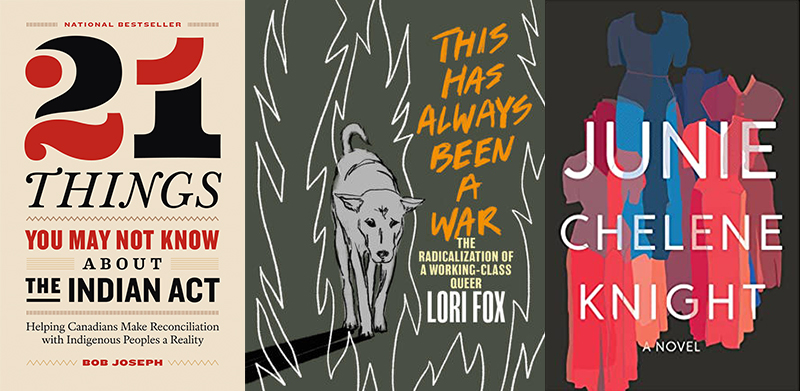
If you want to be a more informed Indigenous ally:
Bob Joseph, 21 Things You May Not Know About the Indian Act (Indigenous Relations Press)
Read 21 Things You May Not Know About the Indian Act. Just read it. We know it’s been on your list since first it was published in 2018. This, this, dear reader, is the summer you’re going to read it. Not only because it’s a short, accessible read that will clear up any confusion about the harms inflicted by the act. But also because it will prep you for author Bob Joseph’s just-released self-guided course of the same name.
For a window into Canada’s current class war:
Lori Fox, This Has Always Been a War (Arsenal Pulp Press)
This Has Always Been a War features essays about Lori Fox’s work and family life — highlighting the difficulty of the banal, and the banality of the difficult. After living through a childhood marked by trauma, Fox must make their way through adulthood without the family connections they’ve left behind in order to find peace and safety and freedom — in a world that is often openly hostile to Fox’s gender, and queerness, and where it is difficult to make the fruits of labour align with the rising costs of rent. Read our interview with Fox.
For a coming-of-age artist's story set in Depression-era Vancouver:
Chelene Knight, Junie (Book*hug)
Set in 1930s Hogan’s Alley in Vancouver, Junie is a coming-of-age tale that explores a young Black girl’s complicated relationship with her mother, who “doesn’t follow the rules,” but rather “rewrites them” — and journey to fit in and find her place in her surroundings, even as those surroundings are under threat. Sometimes, the narrator is outside looking in, and sometimes, inside looking out — mirroring Junie’s movement through her world as she peeks through windows, sometimes entering the closed-off spaces within. And it sets us up, too, to understand that Junie is an artist, one who will slowly but surely come into herself.
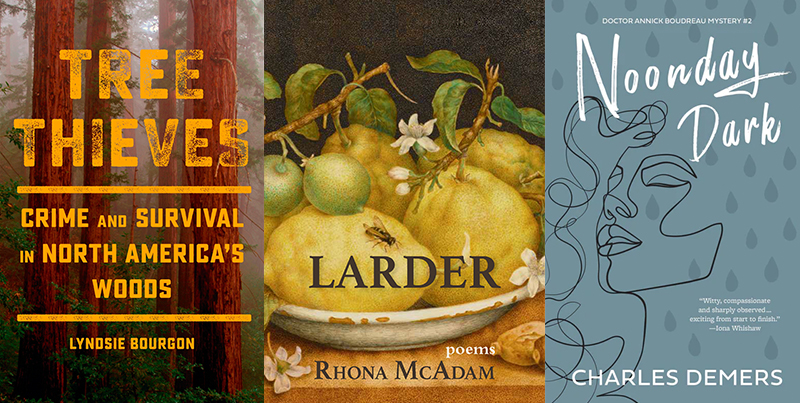
To understand why we’re seeing an increase in tree poaching in BC:
Lyndsie Bourgon, Tree Thieves: Crime and Survival in North America’s Woods (Greystone)
Many readers in British Columbia will be familiar with the booms and busts of the forestry industry — including old-growth logging. But you may be less familiar with the prevalence of tree poaching and illegal harvesting, which has been happening for decades in the shadow of legitimate industry in the Pacific Northwest. Lyndsie Bourgon’s Tree Thieves: Crime and Survival in North America’s Woods follows poachers and those hot on their tails, delving into why people might turn to illegal harvesting to make their living. Read our interview with Bourgon.
For the summer gardener enriched by sinking their hands into earth:
Rhona McAdam, Larder (Caitlin Press)
Gardeners will love Rhona McAdam’s Larder, which considers the wireworm, the wasp, the wild bee, the ant taken over by zombie-ant fungus. Empathy with living creatures and plants that surround us doesn’t just mean understanding life, these poems emphasize; it also means getting one’s hands dirty with death and decay. “Preserving is work / and work is prayer, and this is a wall of it,” McAdam writes in “Abbey Root Cellar, February.” If that line plucks your heartstrings, dig into Larder.
For an urban mystery that delves into the psychology of self in a familiar West Coast city:
Charles Demers, Noonday Dark (Douglas & McIntyre)
One day, a cognitive behaviour therapist’s patient is finally doing well, basking in some recent professional glory and enjoying a new relationship. The next, she’s missing, having left an apparent suicide note. Charles Demers’ Noonday Dark is the second instalment in his Doctor Annick Boudreau series. Its setting is unapologetically Vancouver, both culturally and geographically. Our culture editor, Dorothy Woodend, calls the book “funny, personal and transformative” — what more could you want from a summer read? ![]()
Read more: Media


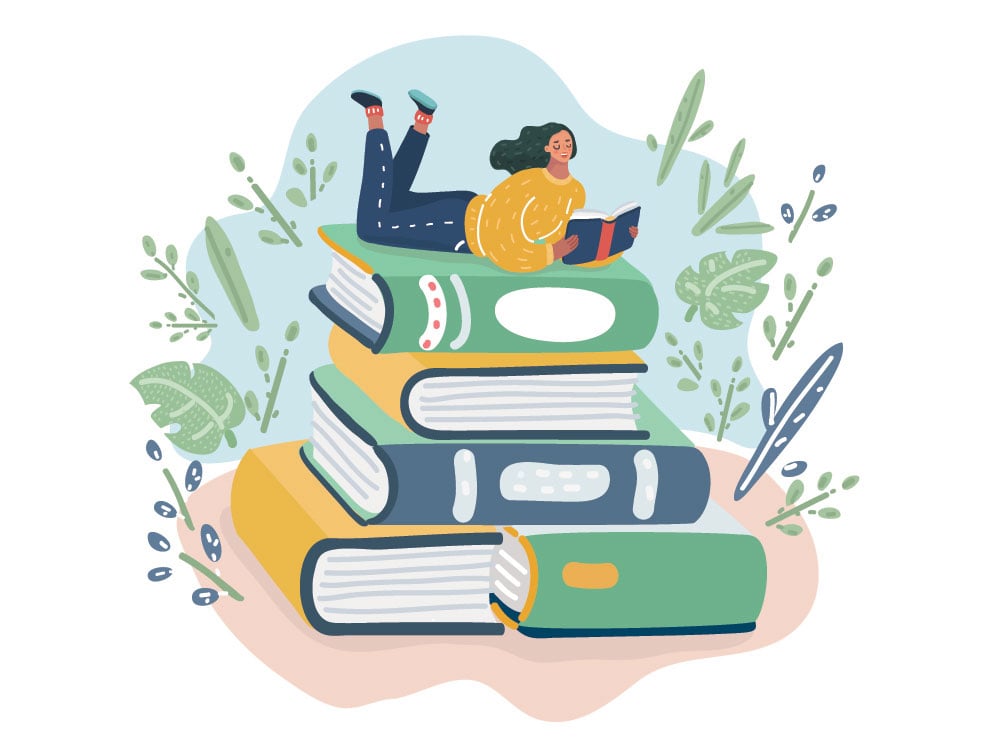












Tyee Commenting Guidelines
Comments that violate guidelines risk being deleted, and violations may result in a temporary or permanent user ban. Maintain the spirit of good conversation to stay in the discussion and be patient with moderators. Comments are reviewed regularly but not in real time.
Do:
Do not: